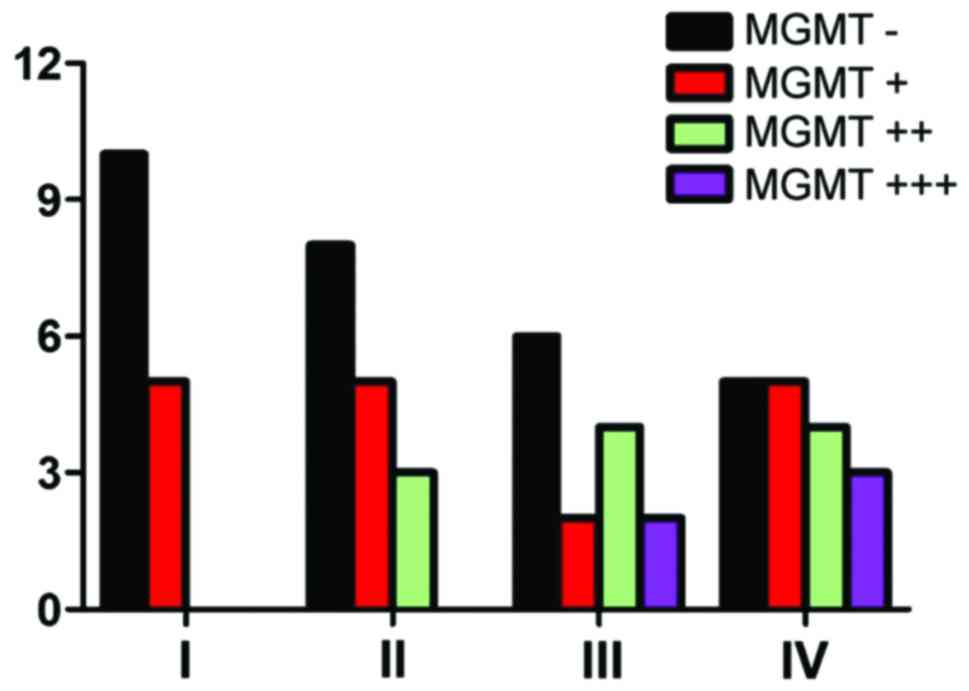|
1
|
Blumenthal DT, Dvir A, Lossos A,
Tzuk-Shina T, Lior T, Limon D, Yust-Katz S, Lokiec A, Ram Z, Ross
JS, et al: Clinical utility and treatment outcome of comprehensive
genomic profiling in high grade glioma patients. J Neurooncol.
130:211–219. 2016. View Article : Google Scholar : PubMed/NCBI
|
|
2
|
Stupp R, Hegi ME, van den Bent MJ, Mason
WP, Weller M, Mirimanoff RO and Cairncross JG: European
Organisation for Research and Treatment of Cancer Brain Tumor and
Radiotherapy Groups; National Cancer Institute of Canada Clinical
Trials Group: Changing paradigms - an update on the
multidisciplinary management of malignant glioma. Oncologist.
11:165–180. 2006. View Article : Google Scholar : PubMed/NCBI
|
|
3
|
Kaina B, Christmann M, Naumann S and Roos
WP: MGMT: Key node in the battle against genotoxicity,
carcinogenicity and apoptosis induced by alkylating agents. DNA
Repair (Amst). 6:1079–1099. 2007. View Article : Google Scholar : PubMed/NCBI
|
|
4
|
Hsu CY, Lin SC, Ho HL, Chang-Chien YC, Hsu
SP, Yen YS, Chen MH, Guo WY and Ho DM: Exclusion of
histiocytes/endothelial cells and using endothelial cells as
internal reference are crucial for interpretation of MGMT
immunohistochemistry in glioblastoma. Am J Surg Pathol. 37:264–271.
2013. View Article : Google Scholar : PubMed/NCBI
|
|
5
|
Jacinto FV and Esteller M: MGMT
hypermethylation: A prognostic foe, a predictive friend. DNA Repair
(Amst). 6:1155–1160. 2007. View Article : Google Scholar : PubMed/NCBI
|
|
6
|
Bocangel D, Sengupta S, Mitra S and Bhakat
KK: p53-mediated down-regulation of the human DNA repair gene
O6-methylguanine-DNA methyltransferase (MGMT) via
interaction with Sp1 transcription factor. Anticancer Res.
29:3741–3750. 2009.PubMed/NCBI
|
|
7
|
Molnár J, Engi H, Hohmann J, Molnár P,
Deli J, Wesolowska O, Michalak K and Wang Q: Reversal of multidrug
resitance by natural substances from plants. Curr Top Med Chem.
10:1757–1768. 2010. View Article : Google Scholar : PubMed/NCBI
|
|
8
|
Tugcu B, Postalci LS, Gunaldi O,
Tanriverdi O and Akdemir H: Efficacy of clinical prognostic factors
on survival in patients with glioblastoma. Turk Neurosurg.
20:117–125. 2010.PubMed/NCBI
|
|
9
|
Yoshino A, Ogino A, Yachi K, Ohta T,
Fukushima T, Watanabe T, Katayama Y, Okamoto Y, Naruse N, Sano E,
et al: Gene expression profiling predicts response to temozolomide
in malignant gliomas. Int J Oncol. 36:1367–1377. 2010. View Article : Google Scholar : PubMed/NCBI
|
|
10
|
Lombardi G, Pace A, Pasqualetti F, Rizzato
S, Faedi M, Anghileri E, Nicolotto E, Bazzoli E, Bellu L, Villani
V, et al: Predictors of survival and effect of short (40 Gy) or
standard-course (60 Gy) irradiation plus concomitant temozolomide
in elderly patients with glioblastoma: A multicenter retrospective
study of AINO (Italian Association of Neuro-Oncology). J
Neurooncol. 125:359–367. 2015. View Article : Google Scholar : PubMed/NCBI
|
|
11
|
Suryadevara CM, Verla T, Sanchez-Perez L,
Reap EA, Choi BD, Fecci PE and Sampson JH: Immunotherapy for
malignant glioma. Surg Neurol Int. 6 Suppl 1:S68–S77. 2015.
View Article : Google Scholar : PubMed/NCBI
|
|
12
|
Chen ZP, Malapetsa A, McQuillan A,
Marcantonio D, Bello V, Mohr G, Remack J, Brent TP and Panasci LC:
Evidence for nucleotide excision repair as a modifying factor of
O6-methylguanine-DNA methyltransferase-mediated innate
chloroethylnitrosourea resistance in human tumor cell lines. Mol
Pharmacol. 52:815–820. 1997. View Article : Google Scholar : PubMed/NCBI
|
|
13
|
Stupp R, Hegi ME, Gilbert MR and
Chakravarti A: Chemoradiotherapy in malignant glioma: Standard of
care and future directions. J Clin Oncol. 25:4127–4136. 2007.
View Article : Google Scholar : PubMed/NCBI
|
|
14
|
Bush ZM, Longtine JA, Cunningham T, Schiff
D, Jane JA Jr, Vance ML, Thorner MO, Laws ER Jr and Lopes MB:
Temozolomide treatment for aggressive pituitary tumors: Correlation
of clinical outcome with O6-methylguanine
methyltransferase (MGMT) promoter methylation and expression. J
Clin Endocrinol Metab. 95:E280–E290. 2010. View Article : Google Scholar : PubMed/NCBI
|
|
15
|
Nitta M, Muragaki Y, Maruyama T, Ikuta S,
Komori T, Maebayashi K, Iseki H, Tamura M, Saito T, Okamoto S, et
al: Proposed therapeutic strategy for adult low-grade glioma based
on aggressive tumor resection. Neurosurg Focus. 38:E72015.
View Article : Google Scholar : PubMed/NCBI
|
|
16
|
Yuan Q, Matsumoto K, Nakabeppu Y and Iwaki
T: A comparative immunohistochemistry of
O6-methylguanine-DNA methyltransferase and p53 in
diffusely infiltrating astrocytomas. Neuropathology. 23:203–209.
2003. View Article : Google Scholar : PubMed/NCBI
|
|
17
|
Esteller M, Garcia-Foncillas J, Andion E,
Goodman SN, Hidalgo OF, Vanaclocha V, Baylin SB and Herman JG:
Inactivation of the DNA-repair gene MGMT and the clinical response
of gliomas to alkylating agents. N Engl J Med. 343:1350–1354. 2000.
View Article : Google Scholar : PubMed/NCBI
|
|
18
|
Rimel BJ, Huettner P, Powell MA, Mutch DG
and Goodfellow PJ: Absence of MGMT promoter methylation in
endometrial cancer. Gynecol Oncol. 112:224–228. 2009. View Article : Google Scholar : PubMed/NCBI
|
|
19
|
Lavon I, Zrihan D, Zelikovitch B, Fellig
Y, Fuchs D, Soffer D and Siegal T: Longitudinal assessment of
genetic and epigenetic markers in oligodendrogliomas. Clin Cancer
Res. 13:1429–1437. 2007. View Article : Google Scholar : PubMed/NCBI
|
|
20
|
Bobola MS, Blank A, Berger MS and Silber
JR: O6-methylguanine-DNA methyltransferase deficiency in
developing brain: Implications for brain tumorigenesis. DNA Repair
(Amst). 6:1127–1133. 2007. View Article : Google Scholar : PubMed/NCBI
|
|
21
|
Rapkins RW, Wang F, Nguyen HN, Cloughesy
TF, Lai A, Ha W, Nowak AK, Hitchins MP and McDonald KL: The MGMT
promoter SNP rs16906252 is a risk factor for MGMT methylation in
glioblastoma and is predictive of response to temozolomide. Neuro
Oncol. 17:1589–1598. 2015. View Article : Google Scholar : PubMed/NCBI
|























